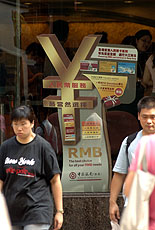 |
| Up or down: Monetary Authority Chief Executive Joseph Yam expects the yuan exchange-rate will fluctuate in the short-term. |
|
|
The yuan exchange rate regime reform has been smoothly conducted, with no sign of destabilising impacts on the local and global financial markets. But the yuan may depreciate against a particular currency, Monetary Authority Chief Executive Joseph Yam says.
In his latest Viewpoint article, Mr Yam said the re-introduction of flexibility in the yuan exchange rate on July 21 is "one of the rare examples of a smooth change".
"For Hong Kong in particular, given that our financial markets are more sensitive than those of other jurisdictions to the change because of our proximity to and economic dependence on the Mainland, it is very encouraging that it has turned out to be a non-event. Our exchange rate remains stable and our interest rates close to those of the US dollar."
The new regime has been described as "a managed floating exchange rate system", where the exchange rate is adjusted on the foundation of "market supply and demand with reference to a basket of currencies".
Difficult task
Mr Yam said in the present circumstances where, with capital account controls, the People's Bank of China is the main market maker in the foreign exchange market, the task is a relatively simple one. As capital account controls are further relaxed, the task will become more difficult.
He anticipated yuan's "real effective exchange rate" will appreciate over time. This can happen in two ways - prices on the Mainland may go up faster than those in the rest of the world or yuan's nominal exchange rate may appreciate.
"Given that inflation can be quite destabilising, appreciation of the exchange rate, if managed smoothly, can be a less risky adjustment vehicle - hence the need for flexibility in the nominal exchange rate.
"However, short-term movements can often deviate sharply from the long-term trend, as sentiment in the foreign exchange market sways in accordance with short-term economic developments or, as is quite common nowadays, short-term market plays by investment houses of all sorts.
"Even if the renminbi appreciates against other main currencies on a weighted average basis, it may depreciate against a particular currency, depending upon developments in the cross exchange rates."
Go To Top
|



